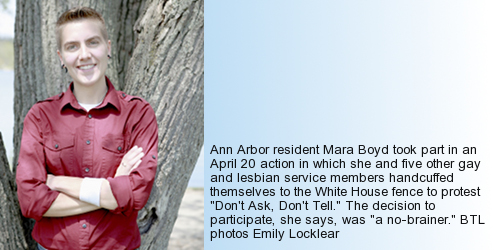by Jessica Carreras

Mara Boyd can still remember the tenets of the United States Air Force, and she recites them proudly as mottos to live her life by: "Those core values are integrity first, service before self and excellence in all you do," Boyd shares from her Ann Arbor home. She lived them so vigorously – in and out of uniform – that when she came out to herself halfway through her University of Colorado ROTC program, living a lie under "Don't Ask, Don't Tell" was not an option.
Stripped of her career, a college scholarship and her identity as an Air Force cadet, now Boyd uses her position to fight against the law that forced her to choose between her life in the service and her life as a lesbian. Years of speaking to groups and college classes culminated last month with an action of civil disobedience that landed Boyd, now 28, in a Washington, D.C. jail alongside five other ex-service members. And she's never been prouder.
Boyd's story is both unique, and common to over 13,000 people who have been dismissed under "Don't Ask, Don't Tell" since its implementation in 1993. Like most of the service members dismissed under the discriminatory policy, she voluntarily came out, sacrificing all she had worked for in order to live her life honestly.
"I needed to decide, unfortunately, unlike any other cadet has to, whether I was going to be able to negotiate lying," she says of her time in the ROTC program.
"I soon experienced how hard it is to be closeted in the military. It's less about not telling or anyone asking … and more about constantly deceiving and actually pretending and creating an illusion that you are heterosexual."
The notion didn't jive with what Boyd had been taught in the Air Force, or with the example she wanted to set for others. Looking back, she says she ultimately has no regrets. "It was not the easiest road, I think, in a lot of ways," she says of her decision to come out. "However, I had to make peace with looking at myself in the mirror for the next five years, and I did what I had to do. It wasn't so much a choice as deciding whether to breathe or not."
But her actions now speak loudly for the woman she has become after being forced to reinvent her life. Her personal experience with DADT has led to speaking engagements, a passion for activism and, recently, her name on national television.
Boyd describes the April 20 action, in which she and five other uniformed officers handcuffed themselves to the White House fence, as a spur-of-the moment decision she made to continue her activism.
"I went to listen to (Lt. Dan Choi's) speech at Eastern Michigan University and I met him afterward and we started a conversation about the coming week and it just sort of all happened very quickly," Boyd recalls. "They were organizing an event and I met him and within 48 hours, I was trying to organize a uniform and tie up loose ends and get out to D.C. in time for the event."
The action, organized by the national LGBT grassroots group GetEQUAL, was the second of its kind protesting "Don't Ask, Don't Tell." In March, Choi and Capt. Jim Pietrangelo were arrested for similar actions; during the April 20 action, the outcome was no different.
For Boyd, the decision to participate was a simple one. "The opportunity and the timing was right, and it was a pretty easy choice, really," she said. "When you spend that large of a portion of your life dedicated to something, and you have an opportunity to continue to participate in a new way, it was a no-brainer."
The prospect of jail time aside, Boyd says the emotions that day ranged from anxious to proud to empowered. "It was very powerful," she describes of the action. "It was refreshing to be able to participate in another form of activism; it was refreshing to physically do something, to engage in a direct action to send a message."
Civil disobedience similar to Boyd's may be the way of the future for LGBT activism. Revved up by speeches like Choi's or experiences like the 2009 National March on Washington, more gay activists are choosing to take to the streets and test their limits, rather than donating to an organization they hope will garner their rights for them.
And with an administration that seems willing to listen, it's understandable why, says Boyd. "People are tired of waiting, especially now that we have leadership that can really create change."
But Boyd maintains that all forms of activism are necessary to get the job done, and if "Don't Ask, Don't Tell" is repealed, she hopes to work for the military again – this time, helping to implement the new policy and educate soldiers.
Likewise, she says, activism on all LGBT issues needs to balance out direct action and education. "Multiple avenues of activism and demanding change and educating are essential," she insists. "A message needs to be sent to the president that the gay community is growing impatient with lip service about change. We demand change and we expect change and we elected him to create the change he spoke of. We're ready for it."
And that, like the motto Boyd lives her life by, is the truth.










